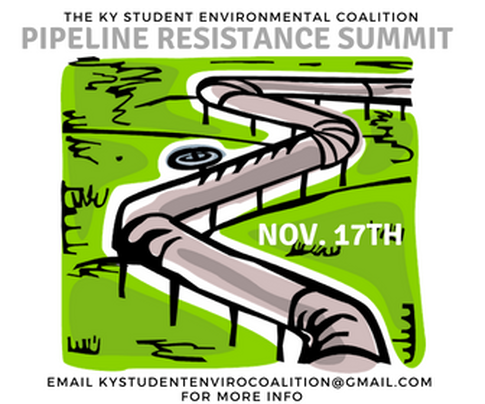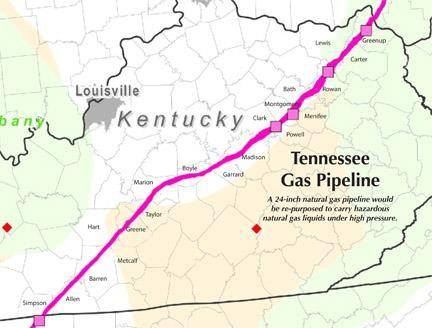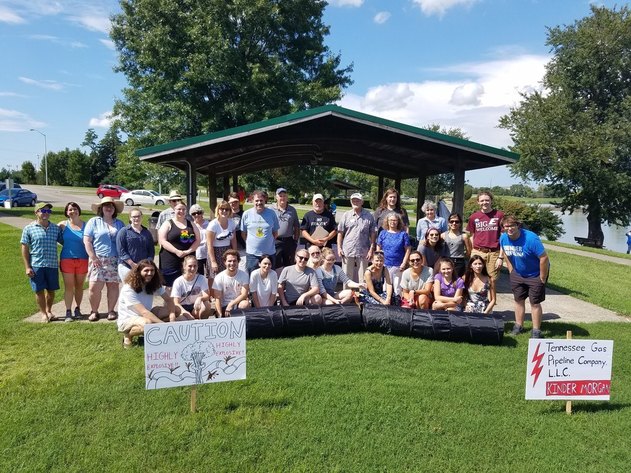Take a stand #ForOurFuture.
KSEC's pipeline fights are led by our Gas and Pipelines (GAP) Working Group. Here you can find information about our Tennessee Gas Pipeline resistance, recent news, ways to get involved, and resources.
If you are interest in joining the working group or would like more information please reach out to Cara Cooper ([email protected]) or Caci Gibson ([email protected]). |
Upcoming Actions

Image Description: A poster with a meandering pipeline over green grass" Text reads "KY Student Environmental Coalition Pipeline Resistance Summit Nov. 17th email [email protected] for more info"
|
Pipeline Day of Action
September 12th on campuses across the state!
November 17th, TBA
Anytime! Anywhere! Last semester KSEC hosted a series of teach-ins on campuses along and near the pipeline route. A teach-in is 1-2 hour event which provides a crash course on the Tennessee Gas Pipeline and how to get involved. Want to host your own? Everything you need to know can be found in our Teach-In Toolkit. Review the Press Advisory here. |
A Note on Pipelines
|
Where does the Tennessee Pipeline stand now? |
|
As an organization, KSEC recognizes that we live on stolen land. Pipeline resistance is a necessary component of standing in solidarity with the Indigenous peoples this land was stolen from. We recognize that those on the forefront of pipeline resistance are most often Indigenous people who have the most to lose. We believe that all pipeline fights are connected; resisting Kinder Morgan's Tennessee Pipeline in Kentucky allows us to stand in solidarity with Indigenous pipeline resistors by showing that we will not allow any pipeline projects. Every new pipeline project benefits white supremacy, and is an act of genocide against the Indigenous peoples of North America. For that reason KSEC says: No pipelines. No Kinder Morgan. Not here, not anywhere. Not now, not ever.
|
September 5: Efforts are still in progress to challenge FERCs decision and require a full environmental impact survey, the case is currently in a DC district court. Meanwhile we are continuing to make sure that people are aware of this controversial project and are working to get universities to write letters of opposition. See pictures from our recent 75th Birthday Party below.
April 13: KSEC has no new updates at this time. We continue to support the legal battle against this pipeline through public education and emphasizing the controversial status of this pipeline. March 7: Kinder Morgan is free to advance their pipeline project. Further legal action is pending. KSEC continues to spread the word and help individuals show their belief that the pipeline is controversial and dangerous. |
Our 75th Birthday party for the Kinder Morgan Tennessee Gas Pipeline was a blast! We had a great time celebrating the absurdity of repurposing an old, dangerous pipeline to carry an even more explosive material. It was awesome to learn more about the work happening across different organizations and to be in an intergenerational organizing space led by youth. Read our press release here and the coverage in the Richmond Register here!
Kinder Morgan's Tennessee Pipeline Project
 Image Description: A map of the Tennessee Gas Pipeline route through Kentucky. The 18 counties it passes through are labeled. Text on the image reads: "Tennessee Gas Pipeline: A 24-inch natural gas pipeline would be re-purposed to carry hazardous natural gas liquids under high pressure."
Image Description: A map of the Tennessee Gas Pipeline route through Kentucky. The 18 counties it passes through are labeled. Text on the image reads: "Tennessee Gas Pipeline: A 24-inch natural gas pipeline would be re-purposed to carry hazardous natural gas liquids under high pressure."
The Tennessee Pipeline is an existing pipeline that stretches across Kentucky on its way from New England to Texas. It is 11,900 miles long, was built in 1943, and is owned by a subsidiary of Kinder Morgan. Why does this 75 year old pipeline matter now? This pipeline was built to carry natural gas, and now Kinder Morgan wants to re-purpose it to carry Natural Gas Liquids (NGLs).
NGLs are bad news if you like clean water and air. NGLs are NOT natural gas. They are not used to produce energy. In fact, they are most often the waste products of fracking. If Kinder Morgan gets their way, these NGLs would most likely be sold exported to make plastic. This pipeline brings no benefit to Kentucky - no energy, no jobs. Instead, Kentuckians would bear the risk of explosions and leaks - leading to injury, death, property destruction, and contamination to air, soil, and groundwater.
All pipelines leak. In fact, this one already has. The Tennessee Pipeline has had 257 "significant failures," which seem to be happening at an increasing rate as the pipeline ages. It cannot be overlooked that this pipeline is 75 years old. In addition to its age, other factors contribute to a frightening likelihood of disaster. First, NGLs must be transported in a highly pressurized state. In order to achieve this, the pipeline must be retrofitted with compressor stations - another point of possible failure. Second, Kentucky has Karst topography, a geological term referring to the way groundwater and limestone interact. This feature means additional pressure points will be placed on the pipeline and further increase the risk of leaks.
When NGL pipelines leak, it's particularly bad. NGLs are heavier than air and tend to stay low to the ground, displacing oxygen. They are usually odorless and colorless and spread across low-lying areas. All together, that means that it's possible to suffocate before realizing that anything is wrong. As if that wasn't enough, the Tennessee Pipeline crosses the state of Kentucky passing through 18 counties past public schools, the Bluegrass Army Depot (where chemical weapons are stored), and Herrington Lake (the drinking water source for Danville).
Kinder Morgan thinks that they can put profit over people to make quick, dirty profit. They think that we aren't paying attention. But we know Kentuckians are not going to let Kinder Morgan threaten our state and our future. Kentuckians say no to pipelines, to fossil fuels, to fracking, to contaminated water, and to extractive industries.
NGLs are bad news if you like clean water and air. NGLs are NOT natural gas. They are not used to produce energy. In fact, they are most often the waste products of fracking. If Kinder Morgan gets their way, these NGLs would most likely be sold exported to make plastic. This pipeline brings no benefit to Kentucky - no energy, no jobs. Instead, Kentuckians would bear the risk of explosions and leaks - leading to injury, death, property destruction, and contamination to air, soil, and groundwater.
All pipelines leak. In fact, this one already has. The Tennessee Pipeline has had 257 "significant failures," which seem to be happening at an increasing rate as the pipeline ages. It cannot be overlooked that this pipeline is 75 years old. In addition to its age, other factors contribute to a frightening likelihood of disaster. First, NGLs must be transported in a highly pressurized state. In order to achieve this, the pipeline must be retrofitted with compressor stations - another point of possible failure. Second, Kentucky has Karst topography, a geological term referring to the way groundwater and limestone interact. This feature means additional pressure points will be placed on the pipeline and further increase the risk of leaks.
When NGL pipelines leak, it's particularly bad. NGLs are heavier than air and tend to stay low to the ground, displacing oxygen. They are usually odorless and colorless and spread across low-lying areas. All together, that means that it's possible to suffocate before realizing that anything is wrong. As if that wasn't enough, the Tennessee Pipeline crosses the state of Kentucky passing through 18 counties past public schools, the Bluegrass Army Depot (where chemical weapons are stored), and Herrington Lake (the drinking water source for Danville).
Kinder Morgan thinks that they can put profit over people to make quick, dirty profit. They think that we aren't paying attention. But we know Kentuckians are not going to let Kinder Morgan threaten our state and our future. Kentuckians say no to pipelines, to fossil fuels, to fracking, to contaminated water, and to extractive industries.
We can stop this pipeline. Here's how.
The Federal Energy Regulatory Agency (FERC) will approve this pipeline if they think it's not considered controversial. It's time to show up and share how controversial we think it is.
Here are actions you can take.
Here are actions you can take.
- Submit Letters to the Editor (LTE) - An LTE is a short letter submitted to your local newspaper. KSEC has a sample LTE you can use. All you have to do is submit.
- Sign up for the newsletter - Our monthly newsletter contains news updates and information about upcoming events. Sign up here.
- Sign up for the Rapid Response Network (RRN) - The RRN is a peer-to-peer texting service that will alert you when there is a clear action that you can take. You'll get texts from a real person, and you'll be ready to mobilize when it's most impactful. Sign up here.
- Share social media posts and talk to your friends - Starting conversations is one of our most effective tools against pipelines. Follow KSEC on Facebook, Twitter, and Instagram to join the conversation.
- Contact your legislators and representatives - Your senator, representative, country judge executive, magistrate, etc can only represent you if they know what you want. Give them a call, or schedule a meeting. Ask them to put pressure on the FERC to stop this project from moving forward. Find your county officials here.
- Write an op-ed or blog post - An op-ed or blog post is longer than an LTE and can be published in a newspaper/on KSEC's blog. They reach a considerable number of people who may be moved by personal accounts.
- Host a pipeline teach-in for your campus or community - A teach-in is a one day event where folks learn, in depth, about the pipeline and how they can get involved. KSEC has developed a toolkit to make this as easy as picking a day and doing the recruitment.
- Join a GAPWG conference call. Email Cara If you want to join our planning calls.
Recent News + Further Reading
- Boyle County judge-exec ask Kinder Morgan to abandon the project - On March 28, The Advocate-Messenger published that Boyle County Judge-Executive Harold McKinney asked Kinder Morgan to abandon this pipeline plan. It is important to note that the pipeline passes through under Herrington Lake, the source of drinking water for Boyle County.
- The FERC denies a request for a stay - On February 25, 2018, the Herald-Leader published that the FERC had a denied a request for a stay, which would have halted progress on the pipeline. According to the article, the FERC reasoned that injury as a result of this pipeline was only theoretical. This places an impossible requirement on activists and citizens to prove the danger of this pipeline. The project is free to move forward, but additional legal measures have been filed.
- Study in Tennessee Shows Pipeline in Disrepair - On January 29, The Tennessean published an article which explores claims that the pipeline is in serious disrepair and is not fit for use.
- The FERC Approves the movement of NGLs through the pipeline - On October 3, 2017, the Herald Leader published that the FERC had approved the transport of NGLs through the pipeline, claiming this action would not have a significant effect on human health or the environment. The project is free to move forward.
Information and Allies
|
Tools and Resources
|





